Escape Velocity Nova is a video game developed by Ambrosia Software in collaboration with ATMOS. It is the third game in the Escape Velocity series of space trading and combat games. It was released on March 19, 2002 for Mac OS X and Mac OS 9, and later ported to Windows and released on July 11, 2003. The game's premise, set in a time period after mankind has discovered hyperspace technology, grants the player freedom to take missions, trade goods, steal from other ships, and enter one of six storylines.

Centipede is a 1981 fixed shooter arcade game developed and published by Atari, Inc. Designed by Dona Bailey and Ed Logg, it was one of the most commercially successful games from the golden age of arcade video games and one of the first with a significant female player base. The primary objective is to shoot all the segments of a centipede that winds down the playing field. An arcade sequel, Millipede, followed in 1982.
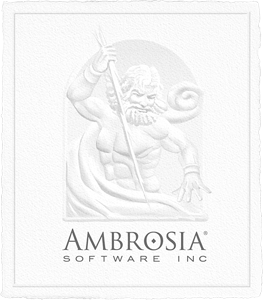
Ambrosia Software was a predominantly Macintosh software company founded in 1993 and located in Rochester, New York, U.S. Ambrosia Software was best known for its Macintosh remakes of older arcade games, which began with a 1992 version of Atari, Inc.'s Asteroids from 1979. The company also published utility software. Its products were distributed as shareware; demo versions could be downloaded and used for up to 30 days. Later the company released some products for iOS. Ambrosia's best-selling program was the utility 'Snapz Pro X', according to a 2002 interview with company president Andrew Welch.
Stunt Copter is a monochrome Macintosh action game written by Duane Blehm and published by his Kansas-based company, HomeTown Software, in 1986. Blehm's other games include Cairo Shootout, ZeroGravity, and PUZZ'L. He died unexpectedly in June 1988.

System's Twilight: An Abstract Fairy Tale is a graphical interactive fiction computer game created by Andrew Plotkin and released in 1994.

Maelstrom is a video game developed by Andrew Welch, released as shareware in November 1992 for Mac OS. The game is an enhanced clone of Atari, Inc.'s 1979 Asteroids arcade game with a visual style similar to the Atari Games 1987 sequel, Blasteroids. Maelstrom was released when there were few action games for the high-resolution color displays of the Macintosh, so it garnered much interest, despite the dated concept, and led to the creation of Ambrosia Software.
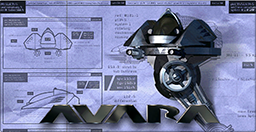
Avara is a 1996 first-person shooter written by Juri Munkki for Macintosh and published by Ambrosia Software. A fast 3D engine, integrated Internet play, and easy level editing were notable features at the time of its release. While not commercially successful, the game found a cult following. Munkki publicly released the source code in 2016, the game's 20th anniversary.
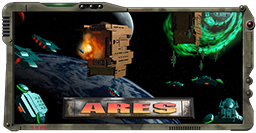
Ares is a space strategy video game created by Nathan Lamont of Bigger Planet Software, and first released by Changeling Software in 1998. In 1999 the game was re-released as shareware by Ambrosia Software and released as open source software and freeware in 2008. The key feature of the game was its ability to zoom in and out smoothly; this allowed the player to switch between a close-up view, which emphasized space combat skills, and a strategic view of the entire map.

The Adventures of El Ballo is a 2D side-scrolling platform game for Mac OS 9 and X released by Ambrosia Software on September 19, 2005. It focuses on blatant, crude humor and mild animated nudity and includes parental controls to disable some content. The game was poorly received by Macintosh publications.

Redline is a video game for Mac OS X developed by Jonas Echterhoff and published by Ambrosia Software. The game's primary features are its ability to simulate actual racing physics, online play, and support for the addition of third party content via plug-ins. The combination of these features have attracted numerous players and led to the creation of a seasonal racing league. Redline also has several modes of gameplay for those who prefer arcade style physics commonly found in other racing games. The game is now currently obsolete and an error message will be displayed upon opening the application as of OS X Snow Leopard and above. However, a fan-made patch allows the game to run on OS X Mavericks and above, but in single-player modes only.

Bubble Trouble is a maze game originally released for Mac OS 7 by Ambrosia Software in 1996. It is an interpretation of Sega's Pengo from 1982 with the penguin recast as a goldfish and the setting moved underwater.

Realmz is a fantasy adventure and role-playing video game first developed and published by Fantasoft in 1994 for the Apple Macintosh as shareware. Fantasoft released a Microsoft Windows-compatible version in 1999, and a science fiction role-playing game based on the Realmz engine, titled New Centurions, in 2001. Realmz was originally written by Tim Phillips on a Macintosh IIsi; he also wrote four game scenarios, including the introductory scenario "City of Bywater". Other original scenario contributors were Jim Foley and Sean Sayrs.

Dust: A Tale of The Wired West is a computer game made for PC and Macintosh. It was released on June 30, 1995, and was produced by Cyberflix and published by GTE Entertainment.

Zone Warrior is a three-dimensional space combat simulator game written by Julian James for Mac OS and published by Casady & Greene in 1997. It was originally released as ZOA. In Zone Warrior, the player is the lone defender of a remote space station under attack by aliens.
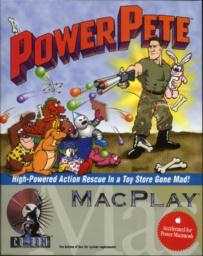
Power Pete is an overhead view 2D shooter developed by Pangea Software and published by Interplay under the MacPlay brand name. It was released in 1995 and packaged with Mac OS 7 on new Macintosh Performa computers. The player's character is an action figure named Power Pete who has to save the fuzzy bunnies of the doll department from the bad toys while progressing through the fifteen levels of the game.

Pillars of Garendall is a role-playing video game that was built by Beenox Studios and Ambrosia Software. It was built using the Coldstone game engine, which was also a joint Beenox/Ambrosia project. The game was released in 2001 for Mac OS Classic, Microsoft Windows and Mac OS X.

The Power Macintosh 9600 is a personal computer that is a part of Apple Computer's Power Macintosh series of Macintosh computers. It was introduced in February 1997 alongside the Power Macintosh 7300 and 8600, and replaced the Power Macintosh 9500 as Apple's flagship desktop computer.

The Macintosh is a family of personal computers designed, manufactured, and sold by Apple Inc. since 1984.
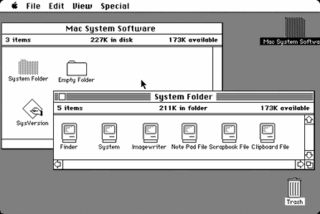
The family of Macintosh operating systems developed by Apple Inc. includes the graphical user interface-based operating systems it has designed for use with its Macintosh series of personal computers since 1984, as well as the related system software it once created for compatible third-party systems.

PegLeg is a video game developed by High Risk Ventures and published by Changeling Software for the Macintosh.















